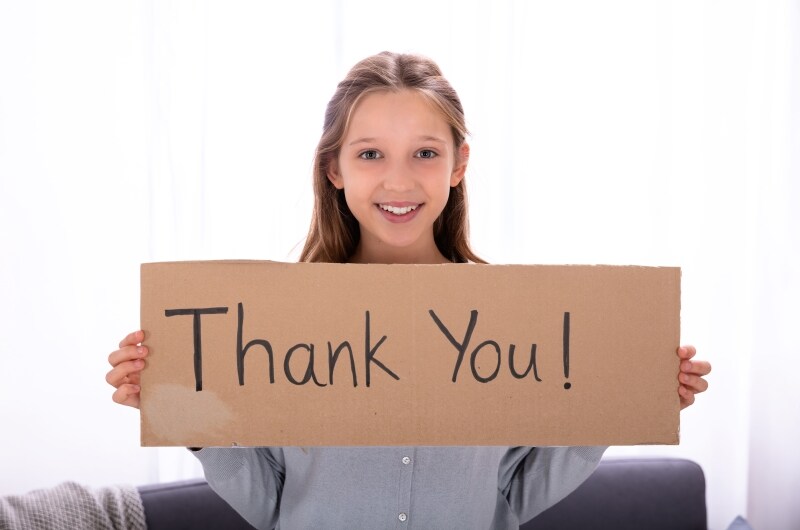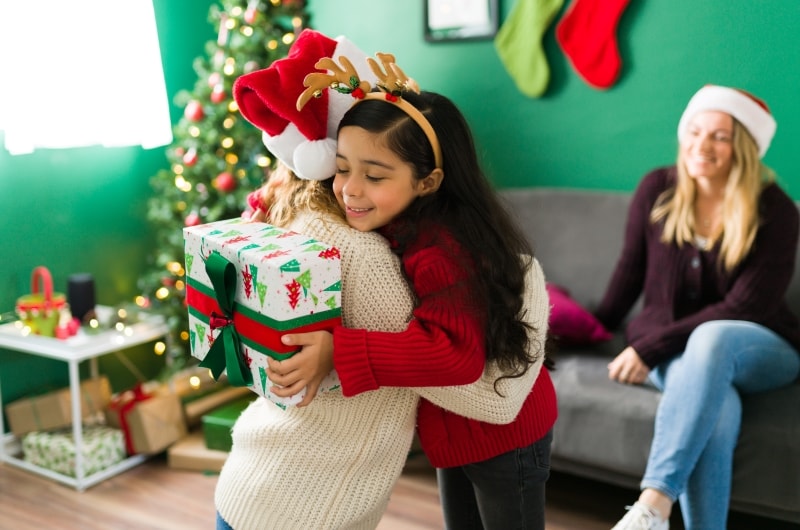The early stages of a kid’s development are considered as his or her formative years. Whatever they learn during this time would be instrumental to how they would be like when they grow up as adults. There are of course many factors that would shape their characters, personalities, and decisions such as the people they meet outside their families or the news and entertainment they get exposed to. Nonetheless, lessons children absorb at a young age would stick to them and would play a factor in their behavior towards others.
One of the simplest yet most important life phrases to teach your kid is a genuine “thank you.” These are two words that are often left floating up in the air, so frequently that it’s easy for it to lose meaning. But what you want to inculcate in your kid by learning how to say “thank you” is a gratitude mindset, to be thankful for life and the little things that add up to make it happy. They should know the difference between saying “thank you” to make themselves appear kind versus wanting to show sincere, heartfelt appreciation.
What better season to teach them how to say “thank you” than Christmas time. It’s a time of giving and receiving, sharing and absorbing, spreading love and feeling it–a time that your kids must have a gratitude mindset in order to enjoy and learn from the season.

Why It’s Important to That Kids Learn How To Say Thank You
Saying “thank you” is as important as saying “please.” Parents should teach kids that when they say thank you, it doesn’t put them in an inferior position. On the positive, it makes one empathetic and humble say “thank you” even to the smallest of things. Saying “thank you” also helps children recognize gratitude from others for something that they have done.
Moreover, when you raise a kid that knows how to say “thank you,” you are teaching them not only to be better friends but also to approach life with gratitude and contentment. This possibly helps relieve them of anxiety and depression that often result from feeling unloved and underappreciated.
Here are some ways how you can teach your kid to say “thank you” and carry this grateful mindset:

1. Be an example.
Live your own life with the same approach. Be grateful for life, even just living through and waking up another day. Be thankful to be surrounded by family and friends.
Aside from this, another effective way is to build the habit of saying thank you to your kids. Most parents think that kids are indebted to them or are obligated to do household chores that when they follow through and do a good job at it, “thank you” from the parents isn’t required anymore. It teaches discipline but it doesn’t mean that it doesn’t warrant a “thank you.” It will make your kid feel appreciated and motivate them, even more, to do well in everything they seek out to do in life. Saying “thank you” to their efforts would help reinforce the action and chances are, they will do it again out of love.
2. Teach the meaning behind saying “thank you.”
They say that “thank you” actually translates to “I appreciated your effort to do something for me.” When kids grasp this meaning, it would become easier for them to genuinely say the words when they do. As early as now, you should kill that thinking that they should only say “thank you” when they like the gift or the action that they received. The tendency is that they’ll only say thank you to the things they liked while failing to acknowledge the effort and the thought that went behind every gift.

3. Help your child recognize the feeling of being thanked.
Humans have this innate need to feel appreciated or acknowledged. Your kid will surely understand the importance of saying thank you when they remember how it felt to them when they received the phrase themselves. Talk to them and compare it to the feeling they got when their efforts went unnoticed or were not appreciated. This teaches kids the value of empathy and how a simple “thank you” can have a positive impact on someone's life.
Be extra this Christmas season and teach your kids how to go beyond just saying the words “thank you.” The words may not be uttered but they could also be in the form of gifts or acts of service. The FlexiSpot Christmas Gift House is already up until January 7, 2022, so you have plenty of time to shop and enjoy crazy discounts on FlexiSpot’s ergonomic products that you won’t get at any time of the year. We’re sure your kid’s Math teacher, aunt or friend will be thankful for the piece of ergonomic furniture they’ll get to upgrade their home workstation.

4. Teach your kid to be thankful to the giver.
Again, your kid should know that it doesn’t matter that much if he or she likes the gift. It was never about the material things and more about being thankful for the gesture and the person giving it. Again, it’s important that kids know how to say thank you because they are thankful for the effort, for what the person has done to them. It will help if your kid genuinely appreciates the giver. There might be some things that this person does that annoy your kid but teach your children to look past that and to see how good these people actually are by seeing the value of their effort. Teach your kids as well how to properly say “thank you.” They should establish eye contact and be specific on what they are grateful about.
Final Thoughts
According to Very Well Mind, the four components of gratitude are (1) Notice, (2) Think, (3) Feel, and (4) Do. You have to ask your kid what are the most grateful for in life then help them ponder on the intention behind the gift. Ask them if it made them happy and what exactly it did. Last is to ask them what they want to do after receiving the gift. How do they want to show their appreciation? And do they want to pay it forward because the gift made them feel happy?
Being able to understand their gratitude will help kids be more grateful and appreciative of others. We hope you and your kids have a grateful Christmas celebration.

